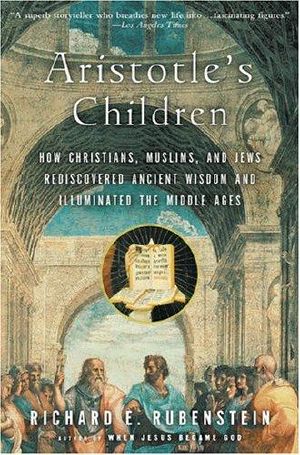Aristotle's Children_How Christians, Muslims, and Jews Rediscovered Ancient Wisdom and Illuminated the Middle Ages

- Authors
- Rubenstein, Richard E.
- Publisher
- Mariner Books
- Tags
- religion , philosophy , history
- ISBN
- 9780151007202
- Date
- 2003-01-01T00:00:00+00:00
- Size
- 0.41 MB
- Lang
- en
A true account of a turning point in medieval history that shaped the modern world, from “a superb storyteller” and the author of When Jesus Became God (Los Angeles Times).
Europe was in the long slumber of the Middle Ages, the Roman Empire was in tatters, and the Greek language was all but forgotten—until a group of twelfth-century scholars rediscovered and translated the works of Aristotle.
The philosopher’s ideas spread like wildfire across Europe, offering the scientific view that the natural world, including the soul of man, was a proper subject of study. The rediscovery of these ancient ideas would spark riots and heresy trials, cause major upheavals in the Catholic Church—and also set the stage for today’s rift between reason and religion.
Aristotle’s Children transports us back to this pivotal moment in world history, rendering the controversies of the Middle Ages lively and accessible, and allowing us to understand the philosophical ideas that are fundamental to modern thought.
“A superb storyteller who breathes new life into such fascinating figures as Peter Abelard, Albertus Magnus, St. Thomas Aquinas, Roger Bacon, William of Ockham and Aristotle himself.” —Los Angeles Times
“Rubenstein’s lively prose, his lucid insights and his crystal-clear historical analyses make this a first-rate study in the history of ideas.” —Publishers Weekly
**
From Publishers Weekly
In 12th-century Toledo, in Spain, a group of Christian monks, Jewish sages and Muslim teachers gathered to study a new translation of Aristotle's De Anima (On the Soul). In Rubenstein's dazzling historical narrative, this moment represents both the tremendous influence of Aristotle on these three religions and the culmination of the medieval rediscovery of his writings. In the fourth century B.C., Aristotle fashioned a new system of philosophy, focusing on the material world, whose operations he explained by a series of causes. As Rubenstein (When Jesus Became God) explains, in the second and third centuries A.D., Western Christian scholars suppressed Aristotle's teachings, believing that his emphasis on reason and the physical world challenged their doctrines of faith and God's supernatural power. By the seventh century, Muslims had begun to discover Aristotle's writings. Islamic thinkers such as Avicenna and Averroes, in the 11th and 12 centuries, embraced Aristotle's rationalist philosophy and principles of logic. Christian theologians rediscovered Aristotle through the commentaries of the monk Boethius, who argued in the sixth century that reason and understanding were essential elements of faith. There resulted a tremendous ferment in the study of Aristotle in the Middle Ages and early Renaissance, culminating in the work of Thomas Aquinas, who used Aristotle's notion of an Unmoved Mover and First Cause to construct his arguments for God's existence. Aquinas, too, argued that reason was a necessary component of faith's ability to understand God and the world. Although the book purports to trace Aristotle's influence on Christianity, Islam and Judaism, it devotes more attention to Christianity. Even so, Rubenstein's lively prose, his lucid insights and his crystal-clear historical analyses make this a first-rate study in the history of ideas.
Copyright 2003 Reed Business Information, Inc.
From School Library Journal
Adult/High School--This is a challenging, intricate book for mature students who are fascinated by the paradox of the Middle Ages: How was the knowledge of Greece and Rome lost, and how was it found again? To set the scene, Rubenstein provides an introduction to the lives and works of Plato and Aristotle, and to the collapse of the Roman Empire in the West. He then shifts his focus to the year 1136, when a group of Muslim, Jewish, and Christian scholars working together in Toledo began translating the philosopher's forgotten works. The dissemination of those translations sent shock waves through Europe as religious leaders tried to reconcile Aristotle's scientific theories with Church doctrine. The struggles between secular rulers and the Church hierarchy, and the development of the medieval universities, are presented with rich detail and feeling. The author shows readers the similarities between those conflicts and the Darwinist/creationist clashes. Students researching topics on the Middle Ages will find this title a useful reference source. Multiple pages are devoted to the lives and works of important figures, such as Abelard, Aquinas, and Innocent II, but the author does not neglect the less well known, such as William of Ockham or Siger de Brambant. Religious orders, heretical movements, and philosophical works are equally well covered. This is a compelling account of how the rediscovery of the writings of Aristotle changed the way the Western world looked at humans, God, and nature.--Kathy Tewell, Chantilly Regional Library, VA
Copyright © Reed Business Information, a division of Reed Elsevier Inc. All rights reserved.